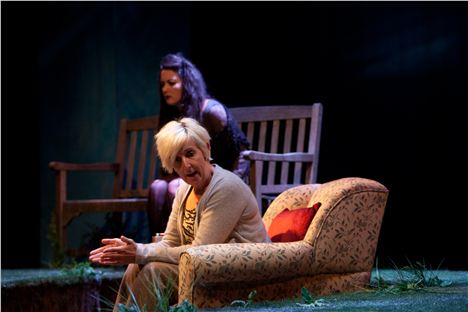BLACK Roses, The Killing of Sophie Lancaster currently in performance at the Royal Exchange takes us intimately into the world of Sophie and her mother, Sylvia.
Few can forget Sophie’s story, a young ‘Goth’ girl, viciously attacked as she tried to protect her boyfriend in a park in Bacup. Her face adorned with piercings, black dreads and black lipstick flashed onto our TV screens and into our newspapers, reappearing days later when life support was switched off and again, months later, when her teenage killers faced justice.
It’s a simple tale of a mother and daughter’s relationship brought to prominence by one horrific incident.
This is a superb piece of theatre, emotionally engaging, necessarily harrowing at times, but carried on such a strong current of love, tolerance, questioning and understanding that you’re glad you’ve seen it.
Amanda Stoodley’s design, places Sylvia (Julie Hesmondhalgh) resting in her arm chair surrounded by a raised rectangle of grass, almost imprisoned. Sophie (Rachel Austin) circles her on the grass, a symbol of her free spirit. At moments they come together, touch and display the love and empathy that runs throughout their monologues.
Sophie’s words are poems, written by Simon Armitage, Professor of Poetry at Sheffield. Sylvia’s words are her own; still with us she speaks eloquently for herself. The performances are superb.
Rachel Austin, who last year shone in 24:7’s Matthew Dunster play I Know Where the Dead Are Buried, displays the warmth of Sophie’s character, throwing herself into life, accepting of differences yet staunchly independent. Her portrayal is multi-layered. Sophie is naïve yet knowing, striving to be different and find her own way, yet comfortable in her loving and accepting home.
It’s good to see Julie Hesmondhalgh performing in such an intimate setting. Taking leave from playing Hayley in Corrie, she gives us a woman we all know, a woman of strength and individuality who’s opened new doors later in life as a mature student, and becomes a successful working mother. Her portrayal is entirely convincing, all the more so for the calm that almost dominates the performance.
In a play lasting 45 minutes we’re given a complete picture Sophie and Sylvia’s relationship and the events, as far as they are known. The piece works on other levels too. Throughout there’s an enlightening display of the complexity of teenage choices.
Is the ‘Goth’ sub-culture choice a statement about beliefs, an attempt to be different, an attempt to join in, a longing to hide, a rejection or acceptance of cultural norms? Is it a statement of confidence or exactly the opposite? Or a mix of all of these? Simon Armitage’s writing on the page tends to suggest that in Sophie’s case it’s a statement of confidence and strength, while Rachel Austin’s performance hints at alternative possibilities. Sylvia’s writing and Julie Hesmondhalgh’s performance allow similar questions about the role of motherhood.
It’s a simple tale of a mother and daughter’s relationship brought to prominence by one horrific incident.
The title, Black Roses? Bruises, blooming and fading. Probably not just Sophie’s.
The piece provoked an unprecedented response when it premiered on BBC Radio 4 last year. The play went on to win the BBC Audio and Music Best Speech Programme of the Year Award.
Perhaps in the future the play may be performed to audiences less informed about the events. In the meantime co-directors Sarah Frankcom, Royal Exchange, and Susan Roberts, for the BBC have helped make this story watchable without compromising the story.
Black Roses continues at The Studio, Royal Exchange Theatre, St Ann’s Square, Manchester until Saturday 29 September
The production supports the ongoing work of the Sophie Lancaster Foundation, which promotes respect and understanding of subcultures in our communities. More information is available at www.sophielancasterfoundation.com














